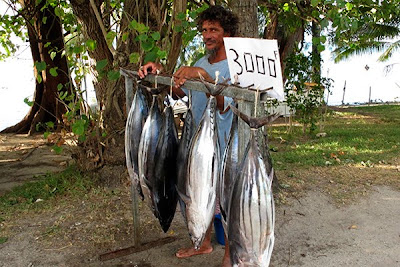 These days, stress seems to affect everything, not the least of which are our oceans. A recent cover story on TIME magazine titled The Future of Fish was anything but reassuring. Our demand for fish is about to exceed the supply. Experts have been predicting for years that un-enforced limits on fishing would eventually begin to wipe out entire species of fish. That day is closing in on us. The problem is so severe that in Asia people are turning to Jelly fish as a source of food (oddly enough, jelly fish seem to thrive in warming ocean temps with more acidity). Some say that aquaculture (manmade fisheries) will be THE answer, but this is not without its own stressors. According to TIME magazine, since 1960 worldwide seafood consumption has increased 60%, leaving our oceans in short supply. 90% of Atlantic Salmon are not wild, rather they come from farms (these fish have to be given pellets to make their flesh pink). Some names of fish have been changed to make them more appealing (and were once thought to be garbage fish decades ago not worth eating) including Chilean Sea Bass (Patagonian Toothface fish—not even a bass) and Orange Roughy (slime face fish). Add to this mix the fact that many wild fish: Tuna, Swordfish and Salmon contain potentially toxic levels of mercury and PCB’s (toxins we then consume) and this is one fish story that no one boasts about.
These days, stress seems to affect everything, not the least of which are our oceans. A recent cover story on TIME magazine titled The Future of Fish was anything but reassuring. Our demand for fish is about to exceed the supply. Experts have been predicting for years that un-enforced limits on fishing would eventually begin to wipe out entire species of fish. That day is closing in on us. The problem is so severe that in Asia people are turning to Jelly fish as a source of food (oddly enough, jelly fish seem to thrive in warming ocean temps with more acidity). Some say that aquaculture (manmade fisheries) will be THE answer, but this is not without its own stressors. According to TIME magazine, since 1960 worldwide seafood consumption has increased 60%, leaving our oceans in short supply. 90% of Atlantic Salmon are not wild, rather they come from farms (these fish have to be given pellets to make their flesh pink). Some names of fish have been changed to make them more appealing (and were once thought to be garbage fish decades ago not worth eating) including Chilean Sea Bass (Patagonian Toothface fish—not even a bass) and Orange Roughy (slime face fish). Add to this mix the fact that many wild fish: Tuna, Swordfish and Salmon contain potentially toxic levels of mercury and PCB’s (toxins we then consume) and this is one fish story that no one boasts about.
Stress Tip for The Day:
By now you have heard of the benefits of eating cold (deep) water fish for their Omega 3 oils. It’s true. Eating fresh fish is quite good for you, but there are caveats. Before you buy your fish from the market, ask the person behind the counter where the fish comes from (farm or wild). If they plead ignorant, find someone who knows. Although more expensive, wild is always preferred over farm-raised fish, including shrimp. Also find out what day the fish comes to market and try to buy it on that day (usually Tuesdays and Saturdays). Rest assured that most restaurants serve “farm raised” salmon (remember, the best choice is wild salmon!) Make a habit to become educated about the health of our oceans and the fish that you eat from them. Finally, consider some new fish recipes to broadend your pallette: Here is a quick recipe: Marinate 2-4 servings of fresh Coho Salmon in Paul Newman’s Italian Dressing for 30 minutes. After preheating the oven, cover then cook the fish in the marinade for 20-30 mins (350 degrees) until done. Serve over a bed of fresh mashed potatoes (not from a box) or wild rice. Add a side of organic corn on the cob (organic butter) and fresh organic greens with raspberry vinegarette dressing. Yum!
Links/Books/Movies Worth Noting:
For starters, see if you can get your hands on, the read the TIME article (July 18th, 2011).
It’s not good news about the ocean fisheries, but here is some more information to understand the bigger picture:
http://news.nationalgeographic.com/news/2002/02/0225_0226_fishcrisis.html
http://www.washingtonpost.com/wp-dyn/content/article/2006/11/02/AR2006110200913.html
Quote for the Day:
“In the hands of an able cook, fish can become an inexhaustible source of perpetual delight.” — J.B. Savarin
Photo of the Day:
Fresh catch of the day! Last summer while in on the island of Moorea (Tahiti) I saw various fishermen out at the end of the day with their catch. This guy was proud to pose with his fish. Fresh fish indeed! Enjoy!
Brian Luke Seaward, Ph.D. is an internationally renowned expert in the fields of stress management, mind-body-spirit healing and stress and human spirituality. He is the author of over 10 books including the bestsellers, Stand Like Mountain, Flow Like Water, Stressed Is Desserts Spelled Backward, The Art of Calm, Quiet Mind, Fearless Heart and Managing Stress (7E). He can be reached through his website:www.brianlukeseaward.net
© Brian Luke Seaward, Ph.D.
